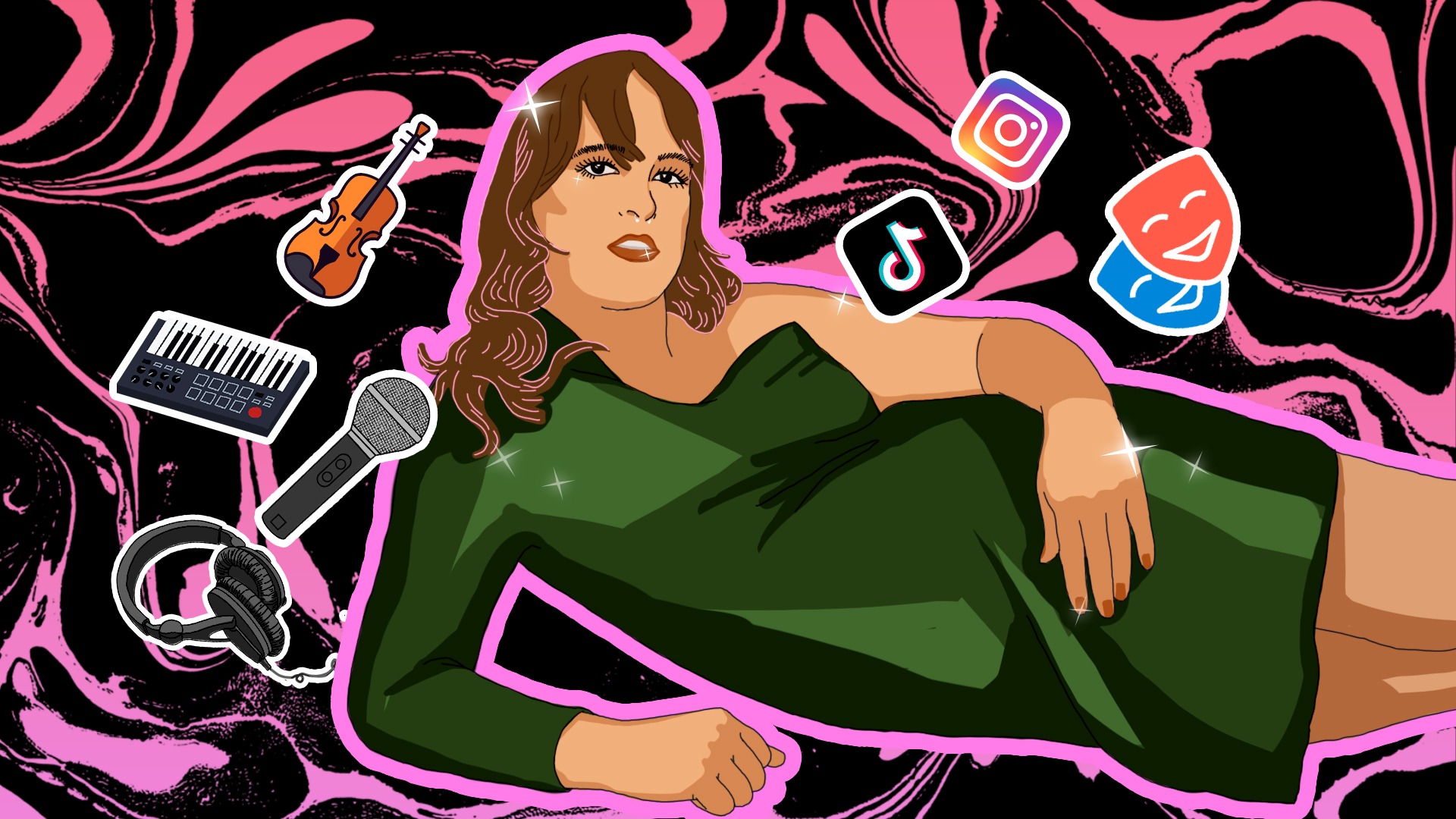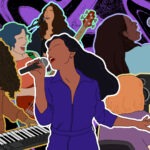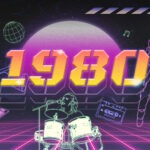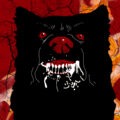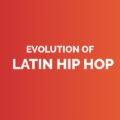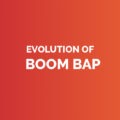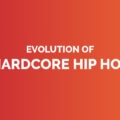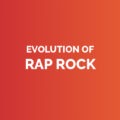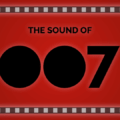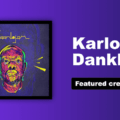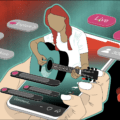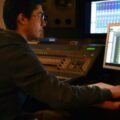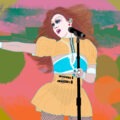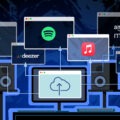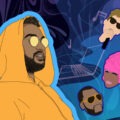If you live in Montreal, or even if you’re just on TikTok, chances are you’ve heard of musician and multimedia artist Eve Parker Finley. Whether she’s making us laugh with painfully relatable comedy, creating viral videos, or writing otherworldly indie pop music, she’s a star on the rise. Her latest project has her on an even larger screen, hosting her own CBC Music show Ten Minute Topline. She invites both emerging and established musical guests such as Basia Bulat and Jeremy Dutcher to write songs in mere minutes, inspired by randomly selected topics, in a variety of genres.
The multitalented media maven sat down with RAC to speak about how she got started, her experience going viral on TikTok, how her creative pursuits connect and diverge, and becoming the artist you want to be.
RAC: Thanks for taking the time, Eve! You have many different creative pursuits. In your own words, how would you define yourself as an artist?
Eve: I always introduce myself as a musician, comedian, and creator of many kinds, because I do do a bunch of different things and they are not all connected to each other. My music and comedy feel very different, but as time goes on, I see them as different expressions of the same artistic mission: help people feel things and also help myself feel things.
RAC: Who are your biggest musical influences?
Eve: I feel very influenced by Canadian indie rock from the late 2000s to early 2010s. There was this era where it was common to see strings in rock bands. Bands like Broken Social Scene made me feel like strings could be cool. That was super influential because I was a classically-trained kid who didn’t like classical music that much. I almost gave up music and violin when I went to university, but then there was this wave of music that made me think classical could be cool.
I also feel very influenced by pop, dance, techno, and house music. Lady Gaga is definitely a big influence – I’ve been a Little Monster since her album The Fame. Then there’s sort of the other side of the spectrum with Enya: ethereal, beautiful, soft. My grandfather used to listen to Enya all the time. I find that it’s not that far away from the classical music I was surrounded by as a kid. Artists like Moses Sumney and Kelsey Lu are big influences too.
RAC: How have those artists helped shape you as a musician?
Eve: The thing that influenced me about Lady Gaga is not so much the music, but the character and how she presents that character to the world. I think it played a huge role in my perception of what it actually means to be the kind of musician I want to be – not just making cool music, but also sharing your personality in a way that helps people connect with what you’re creating.
I love talking and engaging with the public directly; I know a lot of artists struggle with that. I hate that we live in a world where you have to give so much of yourself in order for people to listen to your music. I think musicians should just get to be musicians if they want. But I really love that aspect of sharing myself and connecting with people through it.
RAC: When and how did you start making music?
Eve: I started playing violin when I was three and a half. I’ve been playing it as long as I can remember, but I’ve had to rediscover my relationship with it. By the time I moved away from home, I had been really deep in classical music and I found it all quite stressful. Then when I moved to university, I started playing in small indie bands with friends. It wasn’t until 2015 or so that I felt I had gained the confidence to try writing music on my own.
I spent a lot of time alone experimenting with music, trying to write from different entry points – like looping violin and learning production on Ableton. Figuring out I could run my violin through effects and loops opened up a whole world. As a teen violin player, I enjoyed it most when we got to perform in a big church in a wash of natural reverb, and then when I discovered I could recreate that synthetically, it was really exciting.
It’s still changing! For this latest set of songs that I’ve been working on, I started on piano instead of on violin, which is interesting. My dad is a classical pianist, so the piano has always been a big part of my subconscious. I feel like the next thing I’ll do will start in some other place – we’ll see what happens.
RAC: Do your artforms (music, comedy, TikTok creation, TV hosting) intersect or do you tend to keep them separate?
Eve: I’m currently figuring out how they intersect. I started experimenting with comedy and TikTok in the pandemic. I felt like I always wanted to communicate what I thought about the world and the weirdness of everyday situations, and comedy allowed me to do that in a new way. At the same time, I’ve always loved to make music that’s joyful but also very serious and introspective. The latest way I’ve found that my artforms intersect in my live shows has been experimenting with doing the best parts of my stand-up in between the songs. I love the juxtaposition of telling a really funny story then jumping into a really introspective song – it makes the emotional experience of the show an interesting wave. That’s something I’m thinking about for whatever my next musical project is going to be.
I’ve always been someone who likes to do a bunch of different things, and I like that they don’t have to fit under one umbrella.
RAC: What was the experience of going viral on TikTok and Instagram like for you?
Eve: It’s happened to me a few times. I remember the first time I had a video that hit 1 million views, I felt this high of excitement and dopamine. It’s a physical reaction that you get. Then for a few days after, I experienced a real down and a physical withdrawal from that high.
Now I don’t feel the same joy from getting a ton of views, but the trade-off is I also don’t feel the down from that experience. I think my relationship to social media and how I’m perceived online has gotten healthier. I still love creating things and sharing with people, but I used to post to TikTok like 3 times a day, and now I only post when I feel like it. I kind of miss it but I think boundaries and taking breaks is good. Artists should take note from big musicians who have eras where they’re present with an album, they’re in the press sharing things, and then they disappear for a year. I’m in this for the long run; I want to be an artist for as long as I can. If that means taking breaks then I’m going to do it.
Check out Eve Parker Finley’s music and comedy content on TikTok
RAC: We recently published a piece on avoiding burnout in the creative industry. How do you balance everything you do without getting overwhelmed? Any tips before you get to that point?
Eve: I had a burnout in early 2020 from the fact that I really wanted to be an artist but I was working a stressful full-time job. That led me to go on burnout leave, then I never went back. I’ve gotten close to working so much as an artist that my body was like, ‘are we getting close again to overworking in the way that led us to burnout?’ I try to be very cautious and mindful about that. But you have to learn to listen to what your body is saying and actually pay attention.
For more tips, check out our article: Burnout: Finding Balance in the Music Industry
One thing about burnout that I don’t think people fully internalize is how long it takes to recover from it. I talked to my family doctor and therapist about it – we’re talking like half a year or a year of healing. I had to learn to do nothing. People think they can just take a few weeks off work and be fine but it’s not actually like that, it takes a long time. I think artists should be given the space to do that – even if we feel like we should keep working to avoid falling into irrelevance. You’re not going to be useful and make good art if you’re not healing.
RAC: Congratulations on your very first TV show! Can you tell us a bit about how that opportunity came together?
Eve: It was a confluence of chance and being in the right place at the right time. In 2021, I met CBC Montreal producer Craig Desson during a local interview. We talked about ideas for a long time and wanted to create something that was music-based, but also funny. We finally landed on this idea of a gamified musician interview show where we get to talk to the artist and show their personality without it just being a performance. We came up with 10 Minute Topline, where musicians have 10 minutes to write a melody and lyrics to a backing track based on what we pull out of a hat. It’s so fun to shoot, it’s the perfect distillation of the different things I’m interested in: comedy, but also hosting and music. The first 5 episodes were all people that I know personally in my community and I’m so proud of what we’re starting to do.
RAC: On your show, you focus on songwriting in all its different forms. What does your songwriting process look like?
Eve: It’s different every time. I’ve been starting on the piano recently for the past couple years, and that led me into an interesting direction. I like to find an entry point and then see what builds from there. Lately it’s been piano, but often it’s also synthesizer, violin, or Ableton. Often I’ll build a song to a certain point where it needs words, then I’ll stop and think about words. I really hate lyrics – I’ve never really had a meaningful relationship with words – but words are much more important with this set of songs that I haven’t released, which has been fun to explore.
RAC: Can you reveal any upcoming guests on your show? Any upcoming music projects?
Eve: They’re not confirmed so I can’t say, but it’s still going to be a mix of emerging and more established artists which I think is really fun… and hopefully one day Avril Lavigne. There will also be lots of music this year that I’m so excited to share… but I don’t know when!
Written by Maryse Bernard
Illustration by Yihong Guo
